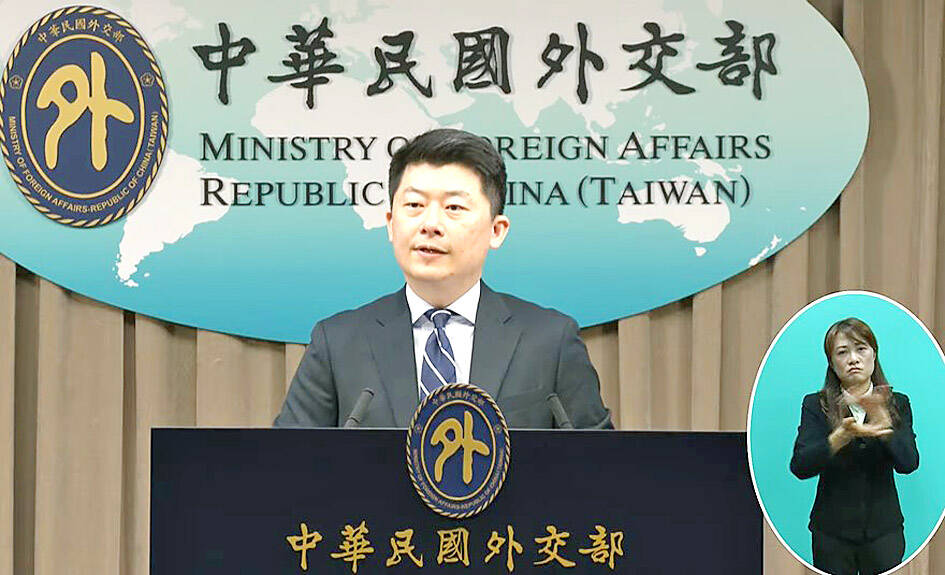The Ministry of Foreign Affairs has advised against traveling to South Africa due to poor public security and warned of telephone scams targeting overseas Taiwanese.
The ministry issued an “orange” travel alert for South Africa at the end of last month due to an increase in cholera cases, rolling power cuts and deteriorating law and order.
South African Police Service statistics showed that 6,289 people were murdered in the first quarter of this year, up 3.4 percent from the same period last year, Department of West Asian and African Affairs Deputy Director Wu Cheng-wei (吳正偉) told a news conference in Taipei yesterday.

Photo: screen grab from a Ministry of Foreign Affairs Web cast
There are an average of 13 carjacking, robbery or theft cases every hour in South Africa, which also indicates a deterioration in law and order, Wu said.
The Taipei Liaison Office in the Republic of South Africa recently received reports from a number of overseas Taiwanese, who said they had received suspicious phone calls and were asked to provide their bank account information or transfer money, he said.
The callers pretended to be staff from the Chinese embassy in South Africa or South African government or law enforcement agencies, Wu said.
The callers said that there were documents or packages waiting for them to collect, that their taxes were in arrears or they were involved in criminal cases in China, he said.
Wu urged people to be aware of these fraudulent practices and to refrain from transferring money or providing account information over the phone.
In case of an emergency, Taiwanese in South Africa can call the local liaison office at 082-802-9380 or the ministry’s emergency number +886-800-085-095, he said.
He also warned about an increase in employment scams in the Caucasus region, where some Taiwanese were recruited to engage in illegal work such as telecom fraud.
Groups have lured Taiwanese with promises of high salaries, then isolated and held them prisoner once they were abroad, he said.
The ministry urged jobseekers to look into the background of the companies they are interested in working for and check whether they are legally registered locally, he said.
When encountering emergencies in countries where Taiwan has no representative office, people can call the emergency line to seek help, he said.

AGING: As of last month, people aged 65 or older accounted for 20.06 percent of the total population and the number of couples who got married fell by 18,685 from 2024 Taiwan has surpassed South Korea as the country least willing to have children, with an annual crude birthrate of 4.62 per 1,000 people, Ministry of the Interior data showed yesterday. The nation was previously ranked the second-lowest country in terms of total fertility rate, or the average number of children a woman has in her lifetime. However, South Korea’s fertility rate began to recover from 2023, with total fertility rate rising from 0.72 and estimated to reach 0.82 to 0.85 by last year, and the crude birthrate projected at 6.7 per 1,000 people. Japan’s crude birthrate was projected to fall below six,

Conflict with Taiwan could leave China with “massive economic disruption, catastrophic military losses, significant social unrest, and devastating sanctions,” a US think tank said in a report released on Monday. The German Marshall Fund released a report titled If China Attacks Taiwan: The Consequences for China of “Minor Conflict” and “Major War” Scenarios. The report details the “massive” economic, military, social and international costs to China in the event of a minor conflict or major war with Taiwan, estimating that the Chinese People’s Liberation Army (PLA) could sustain losses of more than half of its active-duty ground forces, including 100,000 troops. Understanding Chinese

US President Donald Trump in an interview with the New York Times published on Thursday said that “it’s up to” Chinese President Xi Jinping (習近平) what China does on Taiwan, but that he would be “very unhappy” with a change in the “status quo.” “He [Xi] considers it to be a part of China, and that’s up to him what he’s going to be doing, but I’ve expressed to him that I would be very unhappy if he did that, and I don’t think he’ll do that. I hope he doesn’t do that,” Trump said. Trump made the comments in the context

SELF-DEFENSE: Tokyo has accelerated its spending goal and its defense minister said the nation needs to discuss whether it should develop nuclear-powered submarines China is ramping up objections to what it sees as Japan’s desire to acquire nuclear weapons, despite Tokyo’s longstanding renunciation of such arms, deepening another fissure in the two neighbors’ increasingly tense ties. In what appears to be a concerted effort, China’s foreign and defense ministries issued statements on Thursday condemning alleged remilitarism efforts by Tokyo. The remarks came as two of the country’s top think tanks jointly issued a 29-page report framing actions by “right-wing forces” in Japan as posing a “serious threat” to world peace. While that report did not define “right-wing forces,” the Chinese Ministry of Foreign Affairs was